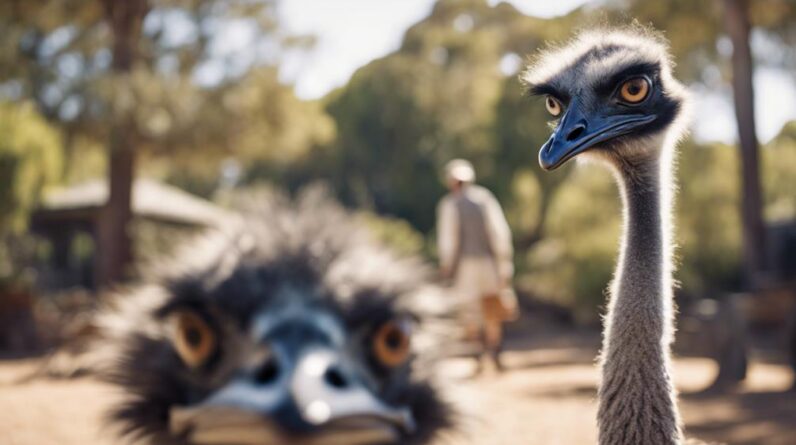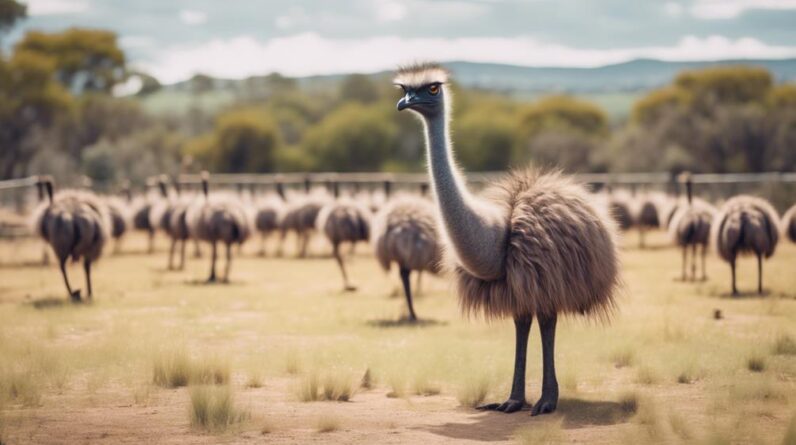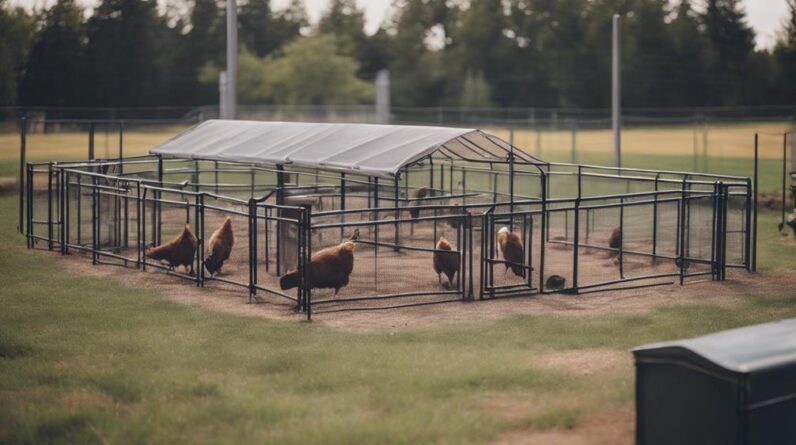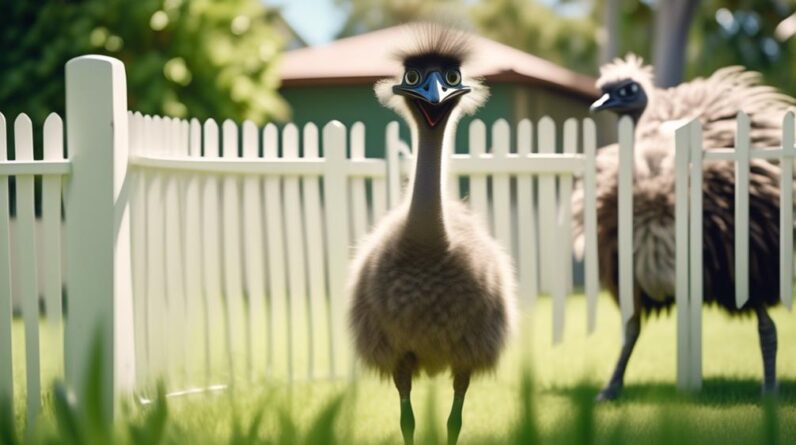
So, you're thinking about getting an emu as a pet? Well, hold your horses, because there's a lot more to these magnificent creatures than meets the eye.
Emus may seem like an unconventional choice for a pet, but they have their own unique charm and personality.
From understanding their behavior and creating the perfect habitat to ensuring their health and legalities, there's a whole world of knowledge waiting for you.
So, if you want to learn everything you need to know about emus as pets, buckle up because this is going to be quite the adventure.
Emu Behavior and Temperament
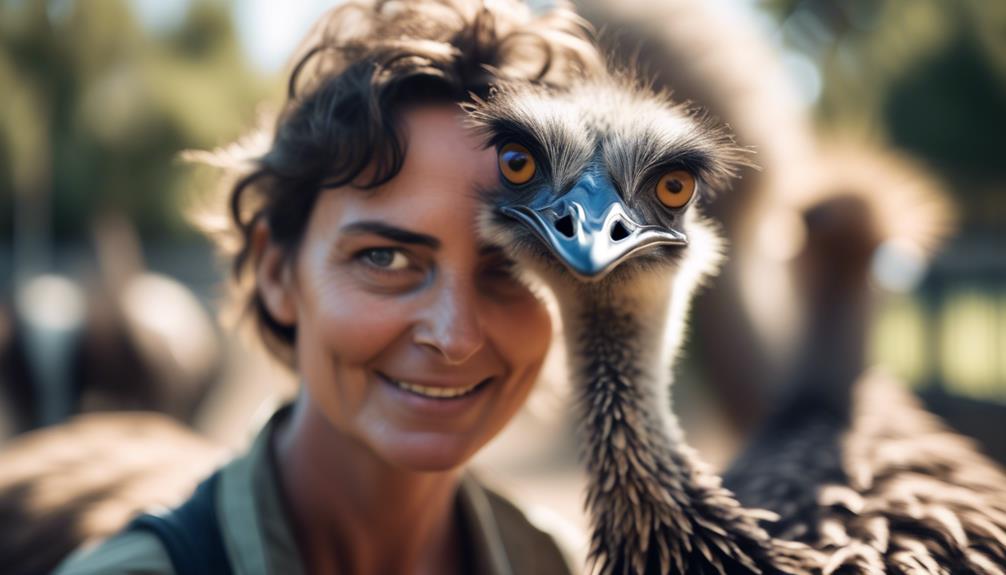
When considering emus as pets, it's essential to understand their behavior and temperament in order to provide them with the appropriate care and environment.
Emus communicate through body language, which can provide valuable insights into their mood and intentions. Understanding emu body language is crucial for building a strong bond with your pet and ensuring their well-being.
Emus can display aggression, especially during breeding season or when they feel threatened. It's important to know how to handle emu aggression to prevent any harm to yourself or others.
When an emu becomes aggressive, it may puff up its feathers, lower its head, and emit low-frequency growling sounds. It may also charge towards perceived threats. In such situations, it's important to remain calm and avoid sudden movements that may further agitate the emu.
It's advisable to give the emu space and slowly back away. If necessary, use a long object, like a broom or a stick, to create a barrier between you and the emu.
Creating the Right Emu Habitat
To ensure the well-being of your emu pet, it's crucial to create an appropriate habitat that meets their specific needs. Emus require a habitat design that allows them ample space to roam and run. Ideally, an emu enclosure should be at least half an acre in size, with a fence that's at least six feet high to prevent escapes.
When it comes to emu habitat design, it's important to provide them with a shelter that offers protection from extreme weather conditions, such as heat, cold, and rain. A simple three-sided shed or barn with adequate ventilation will suffice. Additionally, the flooring should be made of a soft material, like straw or wood chips, to provide comfort and prevent injuries.
Emu habitat maintenance is essential for the health and well-being of your pet. Regular cleaning of the enclosure is necessary to prevent the buildup of waste and parasites. Emus also require access to fresh water at all times, so a reliable water source should be provided within the habitat.
Feeding and Nutrition for Emus
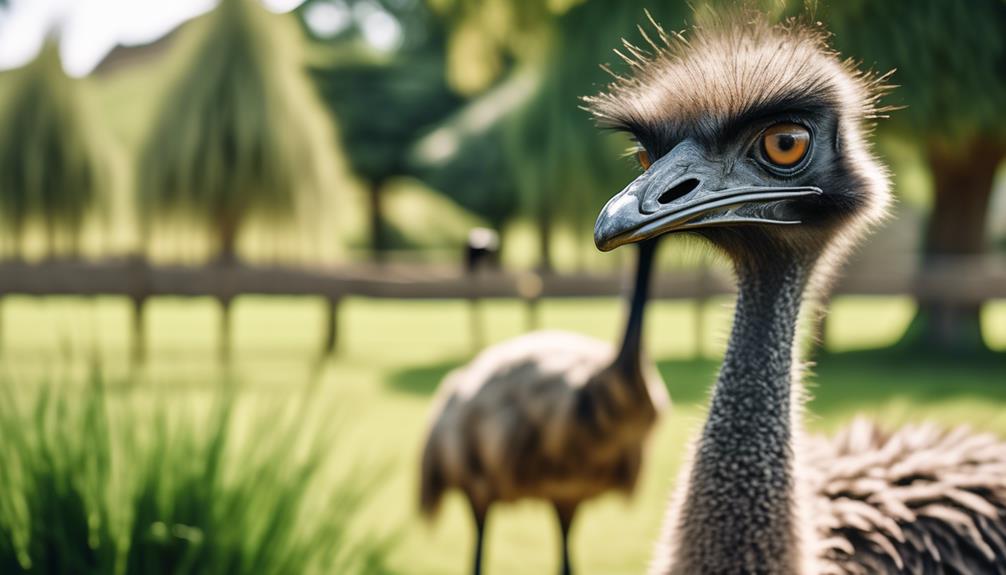
Emus have specific dietary needs that must be met in order to ensure their optimal health and well-being. Feeding your emu a balanced diet is crucial for its overall growth and development. Emus are herbivores, which means their diet consists mainly of plants, fruits, and vegetables. It's important to offer a variety of foods to ensure they receive all the necessary nutrients.
When it comes to feeding emus, there are a few tips to keep in mind. First, make sure to provide a constant supply of fresh water for your emu to drink. Emus have a high water requirement, especially during hot weather. Additionally, emus should have access to a suitable grazing area where they can forage for grasses and other plants. You can also supplement their diet with high-quality emu pellets, which are specifically formulated to meet their nutritional needs.
It is important to note that emus require a low-protein diet, so avoid feeding them high-protein foods such as meat or dairy products. Instead, focus on providing a variety of leafy greens, fruits, and vegetables. Some suitable options include lettuce, spinach, apples, carrots, and cucumbers. It's also recommended to consult with a veterinarian or an experienced emu owner to ensure you're meeting your emu's specific dietary requirements.
Emu Health and Veterinary Care
To ensure the optimal health and well-being of your emu, it's crucial to prioritize their health and veterinary care. Emus, like any other animal, are susceptible to various diseases that can impact their overall health. It's important to be aware of common emu diseases and take preventive measures to protect your pet.
Emu diseases can range from respiratory infections to parasitic infestations. The most common respiratory infection in emus is caused by Chlamydia psittaci, which can lead to severe respiratory distress. Other diseases that emus can contract include avian influenza and West Nile virus. To protect your emu from these diseases, it's recommended to consult with a veterinarian who specializes in avian health. They can provide guidance on vaccination protocols and preventive measures that can be taken.
Emu vaccination is an important aspect of their veterinary care. Vaccines can protect against diseases such as avian influenza and Newcastle disease. Your veterinarian will determine the appropriate vaccination schedule for your emu based on their age, health status, and potential exposure to disease. It's crucial to follow the recommended vaccination schedule to ensure that your emu is adequately protected.
Regular veterinary check-ups are also essential for monitoring your emu's overall health. During these visits, your veterinarian will perform physical examinations, check for any signs of illness, and provide necessary treatments or medications. Additionally, they can offer advice on proper nutrition, housing, and exercise to promote your emu's well-being.
Emu Socialization and Training
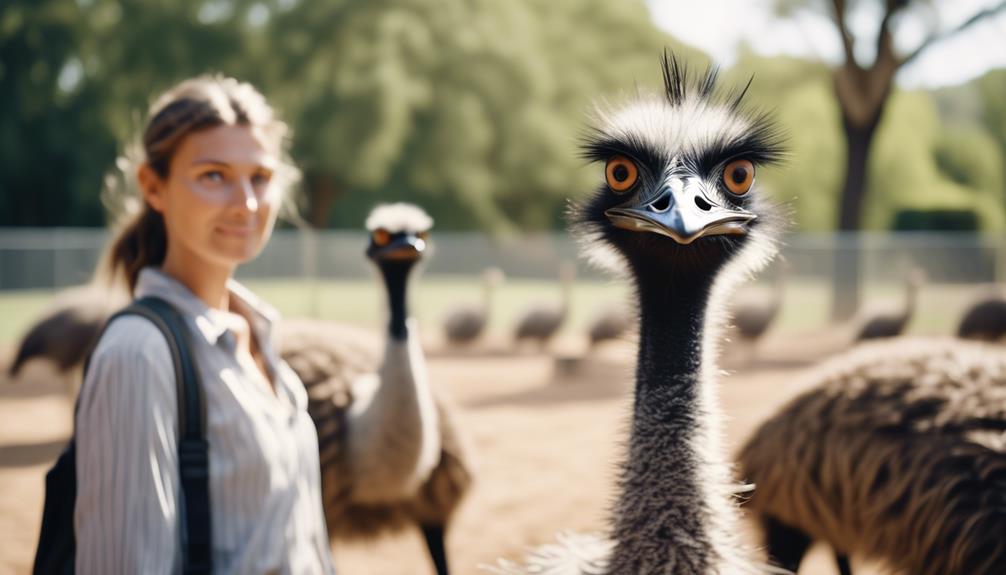
Emu socialization and training play a vital role in ensuring the well-rounded development and behavioral adjustment of your pet. Proper socialization allows emus to interact with humans and other animals in a positive and safe manner, while training helps them learn important behaviors and commands.
To effectively socialize your emu, it is important to expose them to a variety of environments, sounds, and experiences from a young age. This will help them feel more comfortable and confident in different situations. Emus are social birds, so it is recommended to have at least two emus as pets, as they can provide companionship for each other.
Training an emu requires patience, consistency, and positive reinforcement. Emus can be taught basic commands such as "sit," "stay," and "come" using treats and rewards. It is important to start training sessions when the emu is calm and receptive, and to keep sessions short to maintain their attention.
In addition to socialization and training, providing a stimulating environment for your emu is essential for their overall well-being. This can include providing toys, perches, and opportunities for exercise.
Remember, emu socialization and training are ongoing processes that require time and effort. With the right approach, you can foster a strong bond with your emu and ensure they lead a happy and fulfilling life.
| Emu Socialization and Training | |
|---|---|
| Emu socialization | Emus as social birds, benefits of socialization, tips for socializing emus |
| Emu training | Basic commands, positive reinforcement, training techniques |
| Environment enrichment | Toys, perches, exercise opportunities |
Emu Breeding and Reproduction
Breeding and reproduction in emus involve a complex process that requires careful management and understanding of their natural behaviors and reproductive cycles. Emus are monogamous birds, meaning they form long-term pair bonds with their mating partners. When it comes to emu courtship, males engage in a unique and elaborate dance, which involves puffing up their feathers, shaking their bodies, and emitting low-frequency booming sounds. This display is meant to attract a female and establish dominance.
Once a pair has formed, the female will lay her eggs in a communal nest while the male takes on the responsibility of incubation. Emu eggs are large, weighing around 1.5 pounds, and have a dark green color. Incubation typically lasts for about 56 days, during which the male will diligently turn the eggs and regulate their temperature.
After the eggs hatch, the male will continue to care for the chicks, protecting and teaching them until they're independent. It's essential to provide a suitable environment for breeding emus, ensuring they've enough space and privacy. Emus reach sexual maturity at around two years of age, and proper nutrition and veterinary care are crucial for successful breeding.
Emu Legalities and Permits
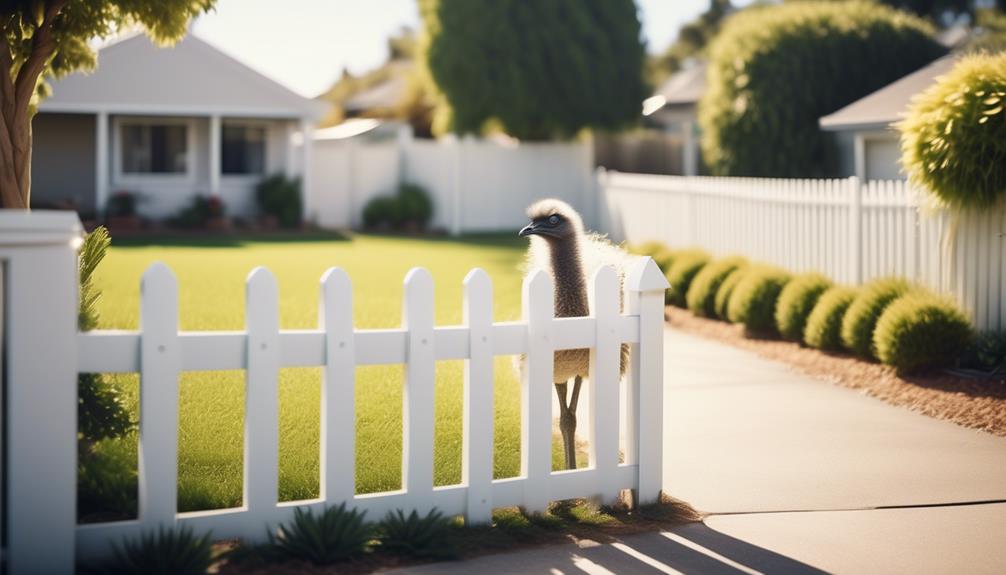
Understanding the legalities and obtaining the necessary permits is crucial for anyone interested in keeping emus as pets. Emu import restrictions and ownership regulations vary from country to country, and even from state to state within a country. To help you navigate through these regulations, here is a breakdown of some key points to consider:
| Emu Import Restrictions | Emu Ownership Regulations |
|---|---|
| Check with local authorities to determine if emu importation is allowed in your area. | Before acquiring an emu, make sure to obtain the required permits and licenses. |
| Some countries have strict regulations on emu imports due to concerns about disease control and the potential impact on local ecosystems. | Ensure that your property meets the necessary space and fencing requirements for emu ownership. |
| If emu importation is allowed, you may need to provide documentation such as health certificates and import permits. | Familiarize yourself with the specific feeding, housing, and care requirements for emus. |
| Consider the costs associated with importing an emu, including transportation, quarantine, and customs fees. | Be aware of any restrictions on breeding or selling emus in your area. |
| It is important to research and comply with all relevant regulations to ensure the well-being of the emus and avoid legal issues. | Regularly review and stay updated on any changes to emu import restrictions and ownership regulations in your area. |
Emu Enclosure and Fencing Requirements
To ensure compliance with emu ownership regulations and to provide a suitable environment for your emus, it's essential to understand the specific requirements for their enclosure and fencing.
Emus are large and powerful birds that require a sturdy and secure enclosure to keep them safe and prevent them from escaping. Here are some key considerations for designing an emu enclosure:
- Size: Emus need ample space to roam and exercise. An enclosure should be at least 1/4 to 1/2 acre per emu to ensure they have enough room to move around comfortably.
- Fencing Height: Emus are tall birds that can reach up to 6 feet in height. To prevent them from jumping or flying over the fence, it should be a minimum of 6 feet tall and preferably constructed with materials that are difficult for them to climb.
- Fencing Materials: Emus have strong beaks and can be quite destructive. It's important to use strong and durable materials for the fence, such as chain-link or welded wire, to withstand their pecking and scratching.
- Ground Cover: Emus are known to dig and can easily escape if the ground isn't properly secured. To prevent this, consider burying the bottom of the fence at least 2 feet deep or use concrete footing to deter digging.
Emu Enrichment and Entertainment
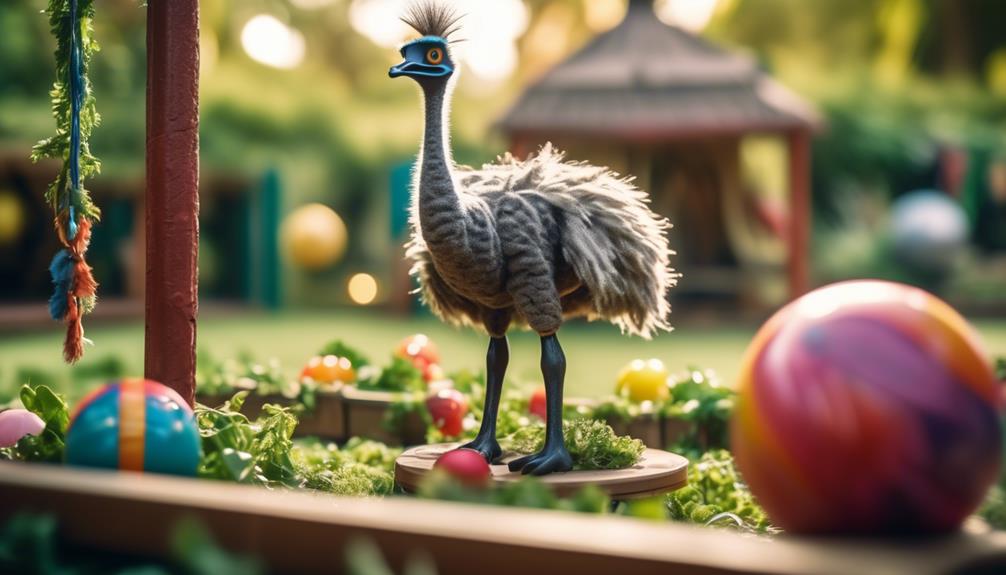
Emus thrive when provided with various forms of enrichment and entertainment to stimulate their natural behaviors and keep them mentally and physically active. Interacting with emus and providing them with appropriate toys are excellent ways to accomplish this goal. Emus are curious creatures that enjoy exploring their surroundings and engaging in playful activities. By offering them a variety of toys and opportunities for interaction, you can ensure their well-being and happiness.
Toys for emus should be designed to mimic their natural behaviors, such as foraging and pecking. Here are some examples of suitable toys for emus:
| Toy Type | Description | Benefits |
|---|---|---|
| Hanging toys | Objects suspended from above for emus to peck at and play with | Stimulate natural foraging behavior and promote physical activity |
| Puzzle feeders | Toys that require problem-solving to access food rewards | Mental stimulation and enrichment |
| Balls | Large, sturdy balls that emus can kick or push around | Physical exercise and entertainment |
| Mirrors | Reflective surfaces that allow emus to see and interact with their own reflection | Social interaction and curiosity |
Remember to choose toys that are safe and durable, as emus can be quite strong and may accidentally break or ingest smaller objects. Regularly rotate and introduce new toys to keep the emus engaged and prevent boredom.
In addition to toys, direct interaction with emus is also crucial for their well-being. Spend time with them, talk to them, and offer treats as positive reinforcement. This bonding time will strengthen your relationship and provide mental stimulation for the emus.
Frequently Asked Questions
Can Emus Be House Trained and Live Indoors?
Yes, emus can be house trained and live indoors. However, there are pros and cons to having emus as house pets. They require a lot of space, have a strong odor, and can be aggressive if not properly socialized.
How Often Should Emus Be Bathed or Groomed?
You should bathe and groom emus regularly to keep them clean and healthy. Emus require frequent bathing to remove dirt and parasites from their feathers. Grooming also helps maintain their appearance and overall well-being.
What Are the Common Diseases or Health Issues That Emus May Face?
Emu health issues and diseases are important to consider when owning an emu. Regular check-ups, vaccinations, and proper nutrition can help prevent conditions like avian influenza and parasites. Seek veterinary care if needed.
Are There Any Specific Laws or Regulations Regarding Emus as Pets in Urban Areas?
In urban areas, there are specific laws and regulations regarding emus as pets. These legal restrictions aim to ensure the welfare of emus and address their suitability for urban living. Emu care, habitat requirements, behavior, and education programs are all important considerations.
Are Emus Known to Have Any Specific Dietary Restrictions or Allergies?
Emus have specific dietary restrictions and allergies. It's important to understand their needs to ensure their health and well-being. Emus require a balanced diet consisting of grains, fruits, vegetables, and protein sources like insects or meat. Avoid feeding them toxic or harmful foods.
Conclusion
Now that you have all the necessary knowledge about emus as pets, you're ready to embark on this unique and fulfilling journey.
Picture yourself in a spacious and secure emu habitat, surrounded by these majestic birds, their vibrant feathers shimmering in the sunlight.
With proper care, feeding, and veterinary attention, you can enjoy the companionship of these fascinating creatures.
Emus won't only bring joy and enrichment to your life but also serve as a constant reminder of the beauty and diversity of the animal kingdom.

